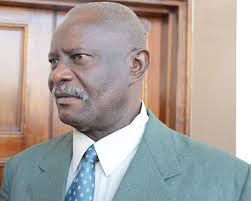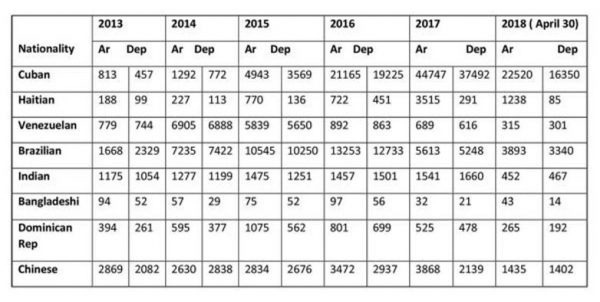Minister of Citizenship Winston Felix says thousands of unaccounted for Haitians and Cubans must have left the country through the `backtrack’ and he also signalled that Guyana’s visa requirement for Haitians would be lifted.
He also accused Chairman of the Parliamentary Sectoral Committee on Foreign Affairs, PPP/C MP Gail Teixeira, of “crying wolf in a crowded cinema” when it comes to the large amounts of Cubans, Haitians and others overstaying their time here and the risk of human trafficking.
Speaking with reporters yesterday on the corridors of public buildings, Felix said that as a former member of the Foreign Affairs Committee he is aware of how important their work is and therefore will appear as requested by the Committee on July 4.
Felix stressed that the thousands of Cuban and Haitian visitors about who Teixeira is concerned are likely to have left the country via illegal means even as he noted that government has “been doing [their] level best to make sure that the consequences of this accumulation of mainly Haitians does not spin off into issues like human trafficking or smuggling.”
“We have a record of those who arrived and we have a record of those who left. The remainder are those who we cannot account for and they can be accounted for with the assumption that there is a leakage on the southern border which is wide, long and easily accessible… in the dry season you can run across it,” he said adding that “for years we have been battling to close down the leakage on the eastern border which we have been unsuccessful since in the days of contraband …people can enter and leave from any backyard in the Corentyne.”
The Minister further explained that monitoring the Eastern border is difficult because of jurisdiction concerns.
“Unfortunately while we can operate on the land it is not so easy to operate in the Corentyne river because of jurisdictional issues which prevent us from chasing down a boat in the Corentyne…anytime you approaching (No.) 66 (Village) going on to Moleson Creek you have to determine where you are [so] in order not to aggravate the situation we operate on land,” he said.
According to Felix the absence of a distinct community of these particular nationals in any of Guyana’s major towns further suggests that they are not staying in this country.
“For me to tell you that I can’t account for how they leave Guyana is partly true and partly untrue because those two openings exist and you have to assume that once you don’t have in Georgetown, New Amsterdam or Bartica particular French or Spanish speaking communities that number of people aren’t here so if they aren’t here they must have left illegally,” he stressed.
The Minister who previously served as Commissioner of Police noted that he was surprised that Teixeira, a former Minister of Home Affairs, who knows the problem and who is well aware of attempts to shut down illegal points of entry and exit in region 6 was the one who wrote to him on the matter.
“To me what she is doing is crying wolf in a crowded cinema which would only cause injury to those who want to escape the wolf. It is an irresponsible act to make Guyanese feel foreigners transiting in Guyana are likely to cause some danger to Guyanese when Guyanese live illegally in Brazil, Trinidad, Barbados, Antigua, all over the world..” he said.
Asked if the regular citizen should be concerned about government’s inability to secure the borders or account for such a large number of visitors, Felix said, “you were born in that situation and it has not resulted in anything untoward.”
“All the people do is arrive spend some time and leave. As early as the 1980s the Haitians were coming here on BWIA overnighting and leaving on Suriname Airways. There is a large diaspora of Haitians in French Guiana and these Haitians travel to reunite with friends and family,” he further explained, noting that Guyana has been most lenient to the Haitians who though a member of CARICOM require a visit to visit this country.
He noted that like Barbados, Guyana is moving abolish the visa requirement though he would not make a definitive statement stressing that it is a matter for the Ministry of Foreign Affairs. In the meantime those Haitians arriving in Guyana have due to “vigilance at the airport gotten the entry requirements down to the finest t.”
“We are alert to the issues which an accumulation of foreign nationals legal or illegal in your country can bring and we have been acting on these issues whenever they present themselves to us,” Felix assured.
`Alarming’
It was during discussions at the committee’s meeting on June 13th , that the “alarming” statistics on the number of Cubans and Haitians overstaying their time in Guyana, but who cannot be accounted for, was brought up and a decision was taken by members to summon Felix and Foreign Affairs Minister, Carl Greenidge to discuss possible human trafficking.
“When you have a large number of people that cannot be found then something is definitely wrong…we have to find out what is really going on,” Teixeira had said during discussions of the findings.
“It’s not a question of who is trickling in. The issue is not who is coming and going; it’s the issue of the numbers remaining and where you can’t find them, you can’t see them…This is trafficking, this is trafficking,” she added.
She had informed that at a sitting of the committee in February of this year questions were raised on the number of Haitians coming into the country but not leaving and a request for statistics on the entry numbers was made of Felix.
On May 23rd Felix wrote to the Clerk of the National Assembly and provided statistics of not only Haitians but of the eight main groups of foreign nationals with the largest arrival and departure figures for the past five years and the first quarter of this year.
Teixeira proposed to the committee that the Ministers of Citizenship and Foreign Affairs be called to answer questions on the data provided and more specifically what government was doing to address human trafficking concerns and what plans are in place to cater for humanitarian efforts for those groups needing assistance.
She had also provided a breakdown of the information and this is shown in the following table with the nationalities and numbers for arrivals and departures of the respective years.




